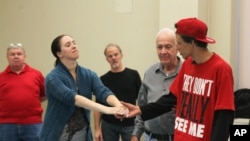William Shakespeare's words from more than 400 years ago are proving to be healing for modern-day veterans.
A group of Milwaukee-area actors started workshops in which veterans depict conflict-heavy scenes from Shakespeare's plays, aimed at helping the former service members deal with post-traumatic stress disorder, addiction and reintegration issues, and mental health problems.
"One of the reasons that the Shakespeare works so well is ... it's this language that just holds big emotion," said actress and project director Nancy Smith-Watson. "It elicits it but it also holds it, the metaphor just enables a lot of emotion to be put on them."
The free program is called "Feast of Crispian," from a rallying speech Henry V gives in the play named for him before a battle in which his forces were outnumbered. It includes the famous "band of brothers" reference.
Walina West, a spokeswoman for the U.S. Department of Veterans Affairs, she wasn't aware of any similar programs nationwide. Since the Milwaukee group started the weekend programs in 2013, more than 300 veterans have taken part.
Focus on mental health
During the workshops, organizers feed lines to the vets so they can concentrate on the emotions. Smith-Watson said the acting helps veterans access bottled-up emotions by using Shakespeare's words, which breaks down walls and builds their confidence. Organizers encourage the participants to be as angry or sad as they want.
The effort expanded this year to include rehearsals and a full production of "Julius Caesar," which will be put on at a Milwaukee theater Oct. 30 through Nov. 1. The group received a $50,000 grant from a Wisconsin foundation last December to support the program.
The 13 veterans in rehearsals now span a variety of ages, backgrounds and service branches, including one who joined the Army at the end of the of Korean War. As the only woman, Army veteran Carissa DiPietro plays Caesar's wife Calpurnia and Brutus' wife Portia.
"It's been life-changing," said DiPietro, 38, of Cudahy, who has struggled with depression and PTSD because of her mother's death, a sexual assault years ago and the beating death of her 5-year-old daughter by her ex-husband.
She says the play, along with a therapist, has finally helped her start grieving.
"It's this character, I feel safe showing these emotions, showing these feelings because it's Portia doing it and it doesn't feel like it's totally me — even though it is me," DiPietro said.
Smith-Watson runs the program with her husband, Bill Watson, and actor Jim Tasse, who both work in the theater department at the University of Wisconsin-Milwaukee. They saw that a similar program worked for juvenile offenders in Massachusetts, and started the program as volunteers on the Milwaukee VA grounds.
Watson-Smith said many come into the workshops thinking they are just going to watch others act, but then see the group provides an accepting environment and they stay to rehearse.
Mike Mitchels, 25, who plays Marc Antony, joined the Army after aging out of the foster care system and spent a year in Iraq, where he came under attack and a good friend was killed. When he returned, he felt like no one understood his experiences and he turned to drugs and alcohol. He's now been sober for six months, and says a big factor is the Shakespeare program.
"I've been able to open up, I've been able to be myself," he said. "I don't feel rejected around these people. I don't feel the need to hide certain things."




